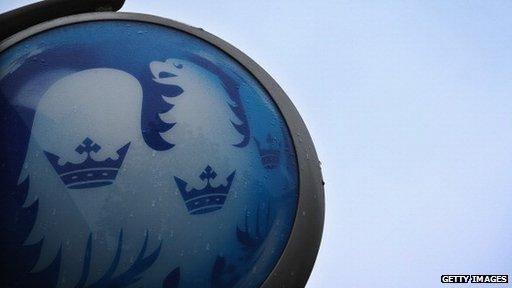Barclays and 'deceit' – here we go again
- Published
- comments

Antony Jenkins, the chief executive of Barclays, should pick up the phone to Peter Sands, his opposite number at Standard Chartered - the huge emerging markets bank based in the UK.
It once tried to get into a fist fight with a US regulator in 2012. And lost handsomely.
On that occasion Ben Lawsky, of the New York Department of Financial Services, alleged in a law suit that Standard Chartered had been guilty of US sanctions violations by trading with Iran.
Mr Sands said the allegations were "incorrect as a matter of law". The bank still ended up paying a fine of $340m (£200m).
Last night, another US regulator alleged that Barclays was guilty of "fraud and deceit".
Not budging
The New York Attorney General, Eric Schneiderman, said that one of the bank's private trading platforms had duped clients, leading to possible losses for global businesses and pension funds representing millions of people.
Barclays says it takes the allegations "extremely seriously". Others sympathetic to the bank suggest that it is worth looking at Mr Schneiderman's electoral ambitions, pointing out he is a state official who is facing re-election in the autumn.
In such circumstances, what could be better than to make a bit of noise about bashing a UK bank?
If he speaks to Mr Sands, Mr Jenkins will soon understand, though, how this story runs.
Barclays initially says it can't find any evidence of wrong-doing (which it has been quietly briefing over the last 12 hours or so).
Mr Schneiderman doesn't budge.
Barclays decides that rather than fight a court case that could take the best part of a decade, it will settle for a fine, joining HSBC and Standard Chartered among those caught out for bad behaviour in the US.
Reading the full lawsuit, Mr Schneiderman raises substantive and important issues - that Barclays operated its "dark pool" trading platform for its own advantage. For a good graphical representation of how a dark pool works, click here, external.
Swimming with sharks
This is what the Attorney General alleges. In a concerted attempt to increase the size of the Equities Electronic Trading Division since 2011 (as a dark pool is called in polite society), the bank invited in aggressive high frequency traders.
They operated against the interests of Barclays' institutional clients who were also using the dark pool as a way of trading out of the public glare and volatility of the public markets such as the London and New York stock exchanges.
Some might say to those institutional investors, if you swim with sharks you are going to get bitten.
In response, institutions point out that they use dark pools to avoid the very high frequency traders who profit from public market information to front run a trade by a matter of fractions of a second and make a profit.
The Attorney General alleges that Barclays was advertising its dark pool as safe - ie largely devoid of aggressive traders - when it was anything but. Mr Schneiderman says it was a deliberate ploy.
If I were an aggressive trader, or even a pretty passive one, I would put a small wager on Barclays coming to some form of agreement on a fine before the end of the year.
Regulators have said that they want to crack down on the operation of dark pools.
But as with the manipulation of the Libor interbank lending rate and allegations of foreign exchange fraud, many might say that once again, officials are looking around for a bolt when the horse has raced off far over the hill.